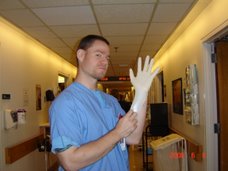
Peterson, C. (January 31, 2001) "Nursing Shortage: Not a Simple Problem - No Easy Answers" Online Journal of Issues in Nursing. Vol. #6, No. #1, Manuscript 1. Available: http://www.nursingworld.org/ojin/topic14/tpc14_1.htm
© 2001 Online Journal of Issues in Nursing Article published January 31, 2001
NURSING SHORTAGE: Not a Simple Problem - No Easy Answers
Cheryl A. Peterson, MSN, RN
Abstract
The article examines the issue of nursing workforce planning within the present health system environment and addresses ethical issues related to the shortage. Numerous factors are influencing both the supply of registered nurses as well as the demand for nursing services. Of particular concern is the negative impact that the current nursing practice environment is having on the retention of registered nurses as well as the ability of the profession to recruit students. Other factors driving this present nursing shortage include the increasing age of working nurses and the potential for retirement; the aging of nursing faculty impacting the capacity of nursing schools; and poor wage compensation. The continual swing in the supply of and demand for nursing services will always be present; however, it is time that nursing sat at the policy-making table with the other decision makers to better anticipate the nature of these changes and how to address them.
Key words: nursing shortage, recruitment of nurses, retention of nurses, demand for nursing services, education, aging nurses, aging faculty, wages/compensation, code of ethics, managed care
The Nursing Shortage: How Real Is It?The question frequently asked of nursing today is, "Is there a nursing shortage in the U.S.?" Unfortunately, a simple "yes" or "no" response to this question is not possible. At 2.5 million registered nurses, 82.5 percent of whom are employed in nursing, we are the largest number of health care professionals in the United States. The dynamics impacting the supply, demand and need for registered nursing services, particularly in this present climate, are often unpredictable and dependent on forces, such as Medicare and Medicaid reimbursement, that are presently beyond nursing's control. Complicating this discussion is the variation in health delivery systems and culture at regional and local levels. This article briefly discusses what we know about the nursing shortage, some of the ethical implications, and the factors that are presently influencing the overall supply of registered nurses.
The rapid changes in the financing and organization of health care delivery through the 1990's continue today. Multiple interrelated factors affecting the demand for nursing services have been identified by researchers and professional organizations. These factors include:
Cost-containment pressures within health care organizations resulting from managed care and an increasingly competitive health care environment
Hospital consolidation, downsizing and reengineering
Reductions in inpatient hospitalization rates
Increased acuity of hospital patients
A shift of outpatient care from hospitals to ambulatory and community-based settings
https://www.nursingworld.org/ojin/topic14/tpc14_1.htm
© 2001 Online Journal of Issues in Nursing Article published January 31, 2001
NURSING SHORTAGE: Not a Simple Problem - No Easy Answers
Cheryl A. Peterson, MSN, RN
Abstract
The article examines the issue of nursing workforce planning within the present health system environment and addresses ethical issues related to the shortage. Numerous factors are influencing both the supply of registered nurses as well as the demand for nursing services. Of particular concern is the negative impact that the current nursing practice environment is having on the retention of registered nurses as well as the ability of the profession to recruit students. Other factors driving this present nursing shortage include the increasing age of working nurses and the potential for retirement; the aging of nursing faculty impacting the capacity of nursing schools; and poor wage compensation. The continual swing in the supply of and demand for nursing services will always be present; however, it is time that nursing sat at the policy-making table with the other decision makers to better anticipate the nature of these changes and how to address them.
Key words: nursing shortage, recruitment of nurses, retention of nurses, demand for nursing services, education, aging nurses, aging faculty, wages/compensation, code of ethics, managed care
The Nursing Shortage: How Real Is It?The question frequently asked of nursing today is, "Is there a nursing shortage in the U.S.?" Unfortunately, a simple "yes" or "no" response to this question is not possible. At 2.5 million registered nurses, 82.5 percent of whom are employed in nursing, we are the largest number of health care professionals in the United States. The dynamics impacting the supply, demand and need for registered nursing services, particularly in this present climate, are often unpredictable and dependent on forces, such as Medicare and Medicaid reimbursement, that are presently beyond nursing's control. Complicating this discussion is the variation in health delivery systems and culture at regional and local levels. This article briefly discusses what we know about the nursing shortage, some of the ethical implications, and the factors that are presently influencing the overall supply of registered nurses.
The rapid changes in the financing and organization of health care delivery through the 1990's continue today. Multiple interrelated factors affecting the demand for nursing services have been identified by researchers and professional organizations. These factors include:
Cost-containment pressures within health care organizations resulting from managed care and an increasingly competitive health care environment
Hospital consolidation, downsizing and reengineering
Reductions in inpatient hospitalization rates
Increased acuity of hospital patients
A shift of outpatient care from hospitals to ambulatory and community-based settings
https://www.nursingworld.org/ojin/topic14/tpc14_1.htm




No comments:
Post a Comment